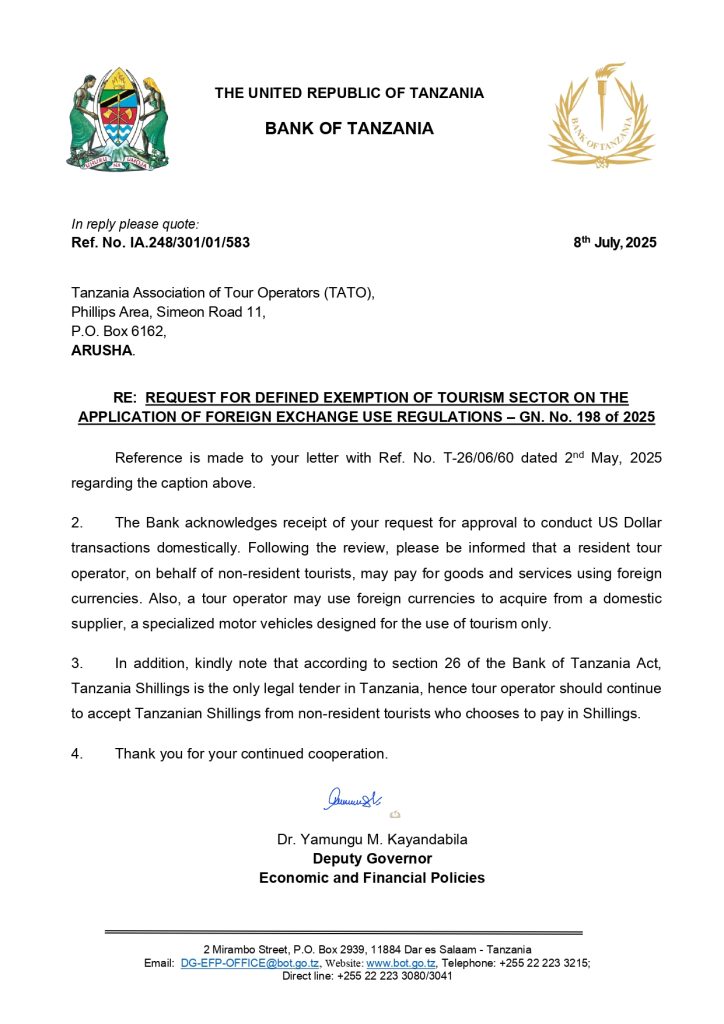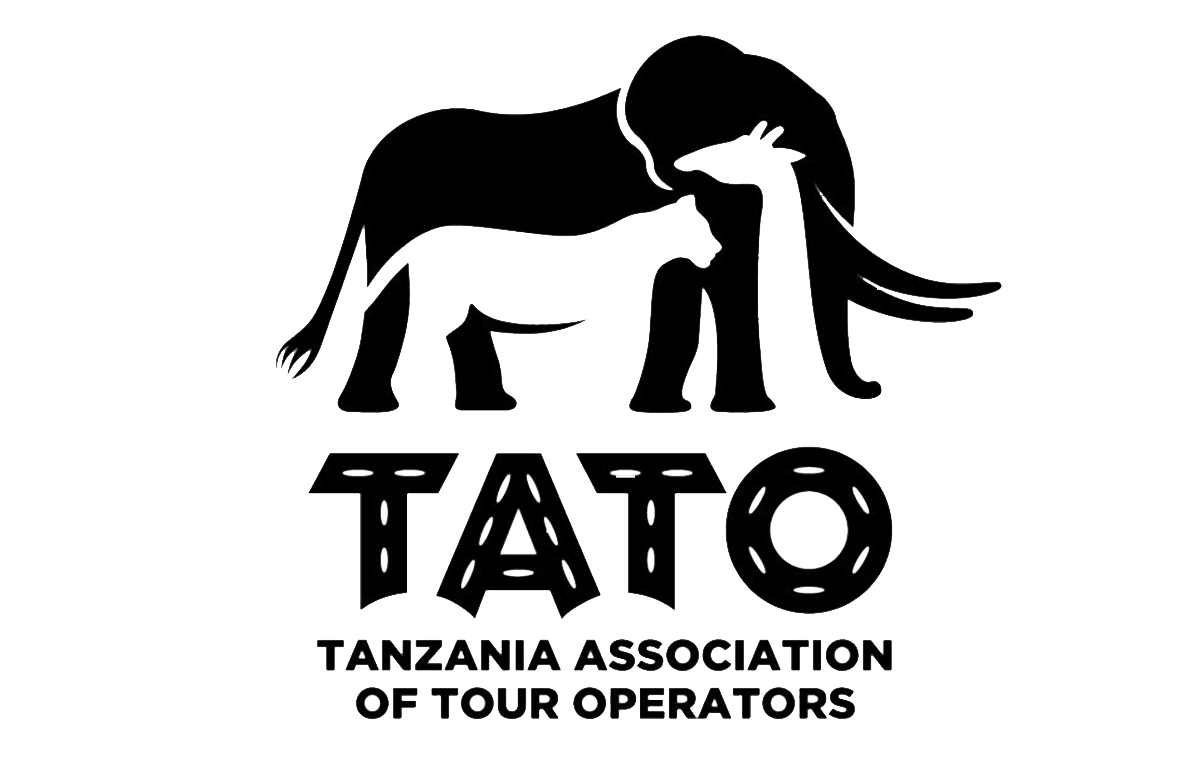BoT Grants Defined Foreign Exchange Exemption for Tanzania’s Tourism Sector

The Tanzania Association of Tour Operators (TATO) is proud to announce a major policy breakthrough for the country’s tourism industry. Following extensive lobbying, engagement, and formal requests, the Bank of Tanzania (BoT) has granted a defined exemption for the tourism sector under the Foreign Exchange Use Regulations (GN No. 198 of 2025) a landmark achievement and a huge relief for stakeholders in the sector.
This success is the direct result of a formal letter submitted by TATO to the Governor of the Bank of Tanzania on 2nd May 2025, with reference number T-26/06/60, titled: “RE: Request for defined exemption of tourism sector on the application of foreign exchange use regulations – GN. No. 198 of 2025.”
This significant milestone is the result of persistent advocacy by TATO, which has consistently raised concerns over the impact of strict foreign exchange regulations on the operations and sustainability of tourism businesses in Tanzania. The regulations, originally enacted under the Bank of Tanzania Act, limited the use of foreign currency in domestic transactions, creating operational challenges for tour operators dealing with non-resident clients who primarily transact in USD and other foreign currencies.
Recognizing the urgent need to protect the sector from unintended harm, TATO swiftly moved into action.

Background: Foreign Exchange Regulations and Industry Concerns
In April 2025, the Government of Tanzania introduced new Foreign Exchange Use Regulations that aimed to streamline the country’s foreign currency transactions and uphold the Tanzanian Shilling (TZS) as the sole legal tender. While the move was well-intentioned in terms of strengthening monetary policy, it sparked concern across the tourism industry, an industry heavily reliant on international clientele and foreign currency inflows.
The blanket enforcement of the regulations meant that:
- Tour operators were restricted from transacting in USD locally.
- Payments to domestic suppliers in foreign currency were questioned.
- There was heightened risk of foreign exchange loss due to compulsory conversion.
- Administrative burdens increased, especially for businesses handling high volumes of international transactions.
Recognizing the urgent need to protect the sector from unintended harm, TATO swiftly moved into action.
TATO’s Intervention: Strategic Engagement and Formal Petition
TATO, as the voice of the private tourism sector in Tanzania, responded proactively. On 2nd May 2025, TATO submitted a formal letter (Ref. No. T-26/06/60) to the Bank of Tanzania, requesting a defined exemption for the tourism sector from the new regulations.
The Association clearly outlined how the implementation of GN No. 198 would disrupt the flow of business operations and negatively affect Tanzania’s global competitiveness in attracting international travelers. TATO emphasized that the tourism industry:
- Contributed over 17% to Tanzania’s GDP (as of 2024 figures).
- Generated USD 3.9 billion in revenue from 2.1 million international tourists and 3.2 million domestic visitors.
- Employed over 1.5 million people, directly and indirectly.
Given these critical statistics, TATO argued that the sector deserved a tailored approach that acknowledges its reliance on foreign currency for operational fluidity and international marketing.
The Breakthrough: BoT’s Response and Defined Exemption
On 8th July 2025, the Bank of Tanzania responded positively to TATO’s appeal. In a letter signed by Dr. Yamungu M. Kayandabila, Deputy Governor of Economic and Financial Policies, BoT confirmed the following key decisions:
- Resident tour operators are allowed to use foreign currency (USD) on behalf of non-resident tourists to pay for goods and services in Tanzania.
- Tour operators may acquire specialized tourism vehicles using foreign currency from domestic suppliers, an essential relief considering the capital-intensive nature of safari operations.
- The BoT reaffirmed that while the Tanzanian Shilling remains the only legal tender for general use, tour operators can still accept TZS from tourists who choose to pay in local currency.
This exemption provides operational clarity and removes the legal uncertainty that previously surrounded USD-based transactions, thus restoring confidence among investors, operators, and clients.
What This Means for the Tourism Sector
The BoT’s decision represents a game-changing moment for tourism operators in Tanzania. It safeguards the sector’s ability to:
- Maintain smooth financial operations when serving non-resident tourists.
- Reduce foreign exchange losses due to unnecessary conversions.
- Continue importing high-standard safari vehicles essential for quality service delivery.
- Plan future investments with greater stability and predictability.
It also confirms that Tanzania is committed to balancing regulatory reform with economic pragmatism, especially in a sector as sensitive and globally exposed as tourism.

TATO’s Role in Securing This Win
This success story is a testament to TATO’s unwavering advocacy, strategic diplomacy, and commitment to representing the interests of its members. Over the past several months, TATO has:
- Held stakeholder consultations with members from various subsectors, including luxury camps, beach holiday providers, safari outfitters, and tour guides.
- Coordinated with the Tanzania Private Sector Foundation (TPSF) to channel concerns to the Ministry of Finance and the Bank of Tanzania.
- Presented well-researched data and practical examples of how the regulations were affecting real businesses.
- Maintained regular communication with decision-makers until a solution was reached.
This collaborative approach reaffirms TATO’s leadership in policy advocacy, stakeholder engagement, and sustainable tourism growth.
Looking Ahead: Ensuring Smooth Implementation
While the exemption is a welcome relief, the next step is to ensure that:
- All tour operators are fully aware of the new scope and limits of foreign currency use.
- Relevant government institutions and financial providers are aligned in interpreting and enforcing the exemption accurately.
- Stakeholders continue to engage with BoT for any future amendments or clarifications.
TATO is committed to offering further support through:
- Member workshops and training on compliance with foreign exchange regulations.
- Legal and operational guidance for businesses seeking to align with the new provisions.
- Continued dialogue with the Ministry of Finance and BoT to monitor implementation.
Conclusion: A Major Step for a Resilient Industry
Tanzania’s tourism industry has weathered many challenges, from the COVID-19 pandemic to global economic pressures. This latest regulatory victory demonstrates that with strong advocacy and data-driven negotiation, real progress is possible.
TATO extends its appreciation to the Bank of Tanzania, the Ministry of Finance, and all tourism stakeholders who participated in this movement. It is a shared success for the industry, and a reaffirmation of the importance of public-private cooperation.
As TATO continues to represent and protect the tourism sector, this exemption sets a precedent for how future policy frameworks can be more inclusive and tailored to the needs of vital economic sectors.
For more updates and member advisories, please visit www.tatotz.org or email us at executivedirector@tatotz.org.
Together, we move Tanzania’s tourism forward—sustainably, transparently, and boldly.

